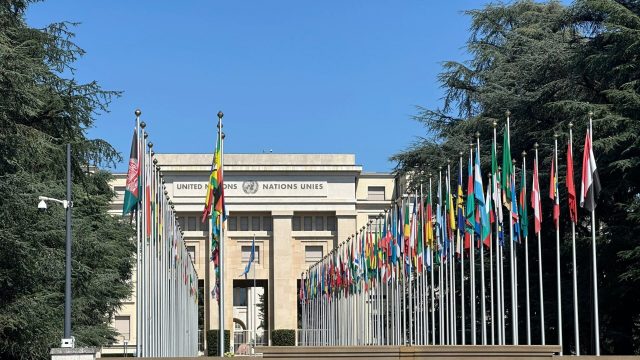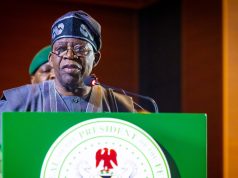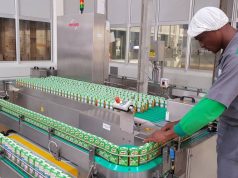As plastic pollution negotiations come to a conclusion this week in Geneva, it appears that Nigeria’s Environment Minister, Balarebe Lawal and other top officials may not be participating in the meeting scheduled for today (Tuesday) in, according to a provisional list of participating ministers seen by PREMIUM TIMES.
In a statement issued Tuesday to participating media correspondents by the United Nations Environment Programme(UNEP), the ministerial participation on the margins of the second part of the fifth session of the Intergovernmental Negotiating Committee negotiations (INC-5.2) will take the form of “informal roundtables” from 12 to 13 August.
“As of today (10 August), more than 70 Ministers and Vice Ministers, as well as some 30 other high-level representatives, are expected in Geneva from 12 August. These figures are provisional,” the statement said.
However, no Nigerian official on the list of the provisional list of expected attendees seen by PREMIUM TIMES.
INC-5.2
Last week Tuesday, nearly 4000 participants, including negotiators from over 180 countries, reconvened in Geneva for what may be the final round of talks to establish a legally binding global instrument on plastic pollution.
An initial draft text of the negotiation, published on Saturday after four days of extensive deliberations across all parties, revealed a deep divide among country representatives from the different negotiation groups (producers and reformers) at the conference.
During a stocktake plenary convened on Saturday by the Intergovernmental Negotiating Committee (INC) chair, Luis Valdivieso, the majority of the presenters (Co-chairs) of the different contact groups requested more time to deliberate and finalise on the different articles being deliberated upon by parties.
At the convening, this publication observed that representatives from Kenya and Ethiopia were the only African nations that delivered a statement for their respective countries.
 Nigeria, considered the “giant of Africa”, was conspicuously absent at the plenary on Saturday. The country was also not among the countries’ representatives that delivered statements or indicated to do so at the plenary.
Nigeria, considered the “giant of Africa”, was conspicuously absent at the plenary on Saturday. The country was also not among the countries’ representatives that delivered statements or indicated to do so at the plenary.
In the face of these emerging concerns, a ministerial convening is expected to be held Tuesday and Wednesday. The UNEP explained that the ministerial gatherings will offer a space for high-level representatives to exchange perspectives on national policies, engage in dialogue on implementation challenges, and explore opportunities for partnerships.
“Ministerial roundtables are closed, and strictly off limits to the media. An official photographer will be present, and official photographs will be available on the INC Flickr album and on ENB’s website,” the statement concluded.
Uncertainty
Messages sent to Nigeria’s environment minister in the early hours of Tuesday via whatsapp has yet to be responded to. Calls to the minister were also not responsive as of press time. It is still unclear who is currently representing Nigeria in the negotiation rooms in Geneva.
Details of countries’ INC-Plastics Pollution focal point persons published on the website of UNEP indicated Charles Ikeah, a Director of Pollution Control and Environmental health at the environment ministry, as Nigeria’s focal point person.
However, messages and calls seeking comments on the process so far, have not been replied to as of press time. Like Mr Ikeah, five other Nigerian delegates, all of whom are officials of the environment ministry, were listed on the UNEP provisional list of participants as well.
These officials include Abubakar Bahijjahtu, Director, Pollution Control and Environmental Health, (Head of Delegation), Salako Oluyemisi Aina, Director, Legal Services,Bukar-Kolo Falmata Yusufari, Deputy Director, Ahmadu Jibrin, Chief Technical Officer, and Dada Oludayo, Advisor, Technical Expert.
But among these delegates, PREMIUM TIMES could only get the contact details of Mr Jibrin, and he has yet to respond to both messages and calls requesting comments on Nigeria’s position on the plastics negotiation.
 A member of the House of Representatives for Kwande/Ushongo Federal Constituency of Benue State, Terseer Ugbor, who is the Deputy Chairperson, House Committee on Environment, and was recently appointed chairman of the Ad-hoc Committee on Single-Use, told PREMIUM TIMES on Saturday that Nigeria has not officially taken a stand yet.
A member of the House of Representatives for Kwande/Ushongo Federal Constituency of Benue State, Terseer Ugbor, who is the Deputy Chairperson, House Committee on Environment, and was recently appointed chairman of the Ad-hoc Committee on Single-Use, told PREMIUM TIMES on Saturday that Nigeria has not officially taken a stand yet.
“No, I’m not in Geneva. I was just appointed chairman of the Ad-hoc Committee on Single-Use Plastic Ban, I will have a comment when we commence work next month,” he said when asked for comments on the issue.
“I don’t think Nigeria has a position yet,” he added.
Poor Representation; Persistent Pollution
Nigeria, Africa’s most populous nation, is among the countries facing plastic pollution crisis, ranking among top global polluters.
Annually, an estimated 2.5 to 3.5 million tons of plastics wastes are generated across Nigeria, with a decimal fraction being recycled. This often leads to widespread ecological damages, since plastics do not decay (are non-biodegradable), impacting both aquatic and terrestrial ecosystems, and posing risks to public health.
Across Nigerian cities and communities, empty water sachets and plastic bottles litter drainages and gutters.
Although efforts are ongoing to address plastic pollution in Nigeria, they are still negligible. One of the states leading this effort is Lagos, Nigeria’s commercial capital. Recently, the Lagos State Government announced that it has commenced full enforcement of its ban on certain single-use plastics (SUPs).
Meanwhile, in the past five sessions of the negotiations which kicked off since 2022, Nigeria was among countries perceived to have participated in the process.
At the final plenary of the first part of INC-5 last year in Busan, South Korea, Nigeria was among the 85 nations that endorsed the Stand Up for Ambition statement.
However, Nigeria did not sign “The Nice wake up call for an ambitious plastics treaty” endorsed by 95 countries on 10 June.
This is against the perception by some environmental groups that Nigeria’s sudden withdrawal could be likened to the $5 billion oil-backed loan President Bola Tinubu is trying to secure from Saudi Arabia.
“Nigeria is similar to Rwanda, actually. Up until earlier this year, it was actually one of the most ambitious states. Now it has completely changed, even pressuring other countries to lower their ambition last week in Nairobi. There are many theories as to why this is the case, but I’m leaning towards Saudi influence,” a top official of a Belgium-based organisation, who does not want his name in print since he was not authorised to speak on the issue, said.
READ ALSO: At UNEP’s Geneva conference, giant sculpture reimagines plastic pollution as public health emergency
The official, who has been at the top of the INC negotiations since its inception, explained that he was convinced that Nigeria’s sudden shift could be as a result of the Saudi deal.
 At the ongoing talks in Geneva, Saudi Arabia, China, Bahrain, Cuba, Iran, Kuwait and Russia, form a bloc that prioritise goals different from those of the “High Ambition Coalition” which Nigeria and other African countries belong to. Instead of limiting plastic production, the Saudi group wants to focus on managing and preventing the pollution of plastic, including through better waste collection and recycling infrastructure.
At the ongoing talks in Geneva, Saudi Arabia, China, Bahrain, Cuba, Iran, Kuwait and Russia, form a bloc that prioritise goals different from those of the “High Ambition Coalition” which Nigeria and other African countries belong to. Instead of limiting plastic production, the Saudi group wants to focus on managing and preventing the pollution of plastic, including through better waste collection and recycling infrastructure.
“Plastics are fundamental materials for sustainable economic growth,”Iran, a member of the Like-minded group, said in a statement.
As the Geneva talks enter their final stretch, negotiators have been tasked to deliver a consolidated draft that can be taken forward to the concluding round of treaty talks.









